Prayer clocks, integral to Muslim religious practices, are essential tools for pilgrims on Umrah packages from Varna 2025. Meticulously designed to mark prayer times, they serve as constant reminders, enabling worshippers to maintain a disciplined routine during their sacred journeys. With a history dating back to ancient civilizations, these timepieces carry profound symbolism, representing Allah's gift of time and fostering mindfulness within Islamic culture. Both traditional and digital models enhance the spiritual experience for pilgrims from Varna 2025 by ensuring accurate prayer times, with modern clocks offering features like language settings for diverse customs.
Prayer clocks, a cultural and spiritual symbol with deep roots in history, have evolved from traditional time-telling devices to modern works of art. This article delves into the rich tapestry of prayer clocks, exploring their significance in religious practices, especially during Umrah packages from Varna 2025. From their historical journey to diverse types and their use in devotions, discover how these clocks serve as a constant reminder of faith and time’s sacred passage.
- Understanding Prayer Clocks: A Cultural and Spiritual Symbol
- The Historical Journey of Prayer Clocks
- Types of Prayer Clocks: From Traditional to Modern Designs
- How Prayer Clocks are Used During Umrah Packages from Varna 2025
- Choosing the Right Prayer Clock for Your Devotional Needs
Understanding Prayer Clocks: A Cultural and Spiritual Symbol
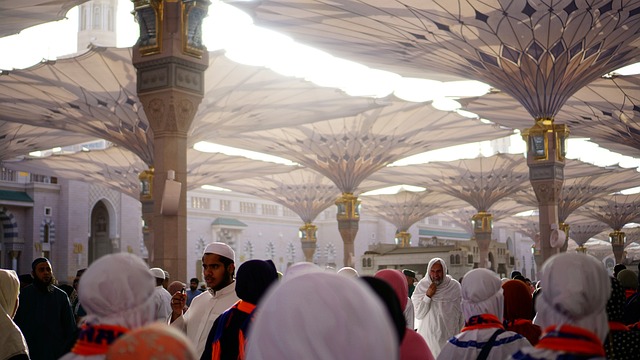
Prayer clocks, often seen as a cultural and spiritual symbol, hold significant importance in various religious practices, especially among Muslims. These timepieces are meticulously designed to mark prayer times, serving as a constant reminder for worshippers to connect with their faith throughout the day. In the context of Umrah packages from Varna 2025, where pilgrims embark on sacred journeys, prayer clocks become indispensable tools. They assist travelers in navigating their daily routines during an often fast-paced and culturally rich pilgrimage, ensuring they never miss a moment of devotional practices.
Beyond their functional role, prayer clocks carry profound symbolism. In Islamic culture, time is considered a precious gift from Allah, and these clocks serve as a visual representation of that divine gift. They encourage mindfulness and discipline in managing one’s time, fostering a deeper spiritual connection. For many Muslims, the sight of a prayer clock ticking away the minutes prompts introspection and devotion, making them popular decorative items in homes and mosques alike.
The Historical Journey of Prayer Clocks
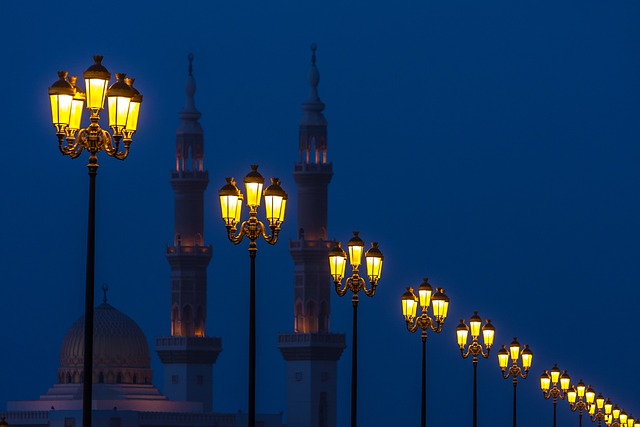
Prayer clocks have a rich historical journey, deeply intertwined with religious practices and cultural evolution. Their origins can be traced back to ancient civilizations where sun dials and water clocks were used to mark time for prayer and worship. However, it was during the Islamic Golden Age that these devices took on a more specialized form, particularly in the design of prayer clocks known as mizahim or mizans. These early mechanisms were developed to help Muslims worldwide keep accurate prayer times, reflecting the expanding reach and influence of Islamic culture through Umrah packages from Varna 2025 and beyond.
Over time, the art of clock-making evolved, leading to intricate mechanical designs that incorporated religious symbolism. In medieval Europe, for instance, prayer clocks became popular among the nobility and clergy, featuring elaborate carvings and artistic representations. The fusion of religion and timekeeping continued with the introduction of pendulum clocks and, later, spring-driven mechanisms, further refining the accuracy and reliability of these devotional tools.
Types of Prayer Clocks: From Traditional to Modern Designs
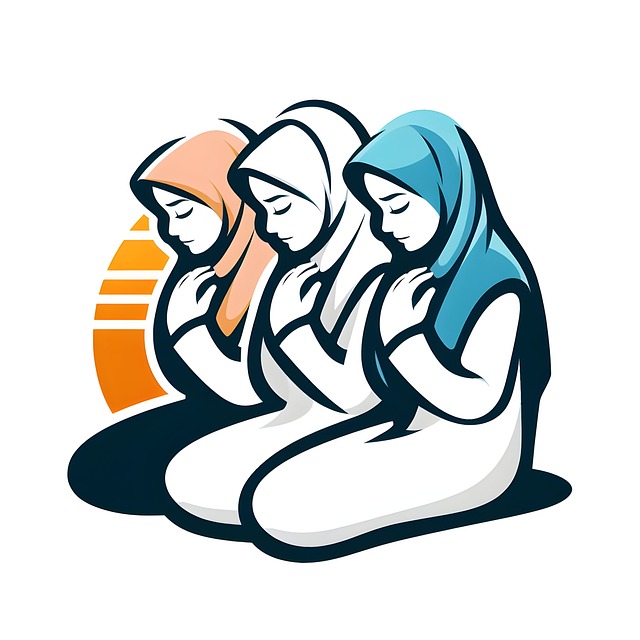
Prayer clocks, a timeless tool for Muslims worldwide, come in a variety of designs catering to different tastes and needs. Traditional prayer clocks often feature a simple dial with markings indicating the five daily prayers, accompanied by chimes or bells to signal each call to prayer. These classical designs hold cultural significance, reminiscent of ancient practices.
In contrast, modern prayer clocks have embraced innovation, incorporating technology and sleek aesthetics. Some models offer digital displays, allowing users to set reminders for prayers and even display relevant Islamic calendar dates. Others blend traditional elements with contemporary styles, appealing to those seeking a fusion of old and new. Even Umrah packages from Varna 2025 can be found integrated into modern prayer clock designs, reflecting the diverse cultural influences encountered on this spiritual journey.
How Prayer Clocks are Used During Umrah Packages from Varna 2025
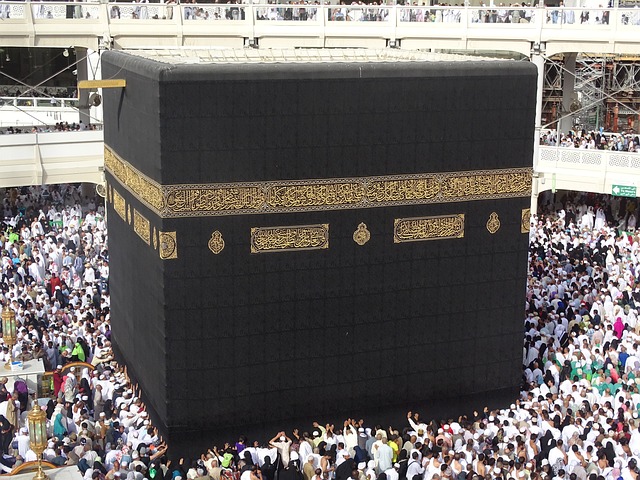
Prayer clocks play a significant role in assisting pilgrims during their Umrah Packages from Varna 2025. These precise timekeeping devices are especially valuable in a foreign land, where navigating new environments and cultural nuances can be challenging. During Umrah, which is a holy pilgrimage to Mecca, keeping track of prayer times is essential for fulfilling religious obligations. With the help of Prayer Clocks, pilgrims can ensure they perform their prayers at the exact designated times, enhancing their spiritual experience.
These clocks are designed with a focus on accuracy and convenience, making it easy for Muslims to stay connected to their faith during their journey. In 2025, with technological advancements, digital Prayer Clocks might gain popularity among Umrah pilgrims from Varna. These modern devices can offer not only accurate prayer times but also additional features like language settings, allowing users to easily navigate the local customs and practices while on their sacred voyage.
Choosing the Right Prayer Clock for Your Devotional Needs
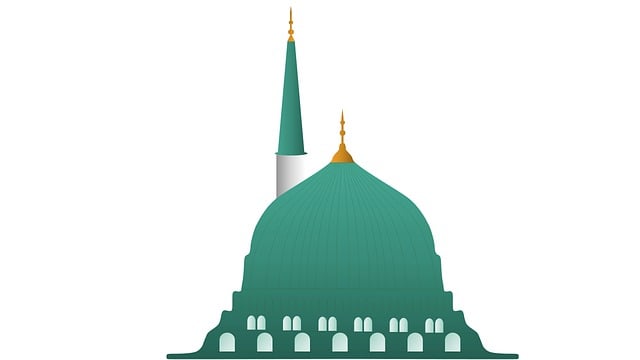
Choosing the right prayer clock is essential for maintaining a consistent and fulfilling devotional routine, especially for those planning Umrah packages from Varna in 2025. Consider your personal needs and preferences; for instance, some clocks offer multiple prayer times, while others have customizable alarms. If you frequently travel, a compact, portable design might be ideal, ensuring your prayers remain on schedule regardless of location.
The display type is another critical factor. Digital clocks provide clear, easy-to-read time indications, suitable for those who prefer a modern aesthetic. Traditional analog clocks, with their delicate hands and classical design, can add a touch of elegance to your space while still functioning effectively for prayer reminders.
Prayer clocks, rich in cultural and spiritual significance, have evolved over time while retaining their essential role as aids for devotion. As witnessed by their incorporation into Umrah packages from Varna 2025, these timekeepers continue to be cherished tools for believers worldwide. Understanding both the historical context and diverse types available allows individuals to select the perfect prayer clock that aligns with their spiritual practices, whether traditional or modern in design.
